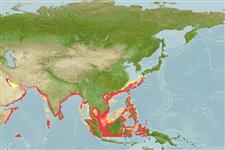Common names from other countries
分类 / Names
俗名 | 同种异名 | Catalog of Fishes(属, 种) | ITIS | CoL | WoRMS | Cloffa
Environment: milieu / climate zone / depth range / distribution range
生态学
海洋; 半咸淡水 居于水底的; 深度上下限 9 - 125 m (Ref. 9895). 热带; 32°N - 5°S, 47°E - 134°E
Indo-West Pacific: Persian Gulf to Sri Lanka and Indonesia, north to southern Japan. Reported occurrence of this species from Niue (Ref. 3804) should be verified.
印度-西太平洋: 波斯湾到斯里兰卡与印度尼西亚, 北至日本南部。 来自纽鄂岛 (参考文献 3804) 的这种的发现记录应该被查证。
Length at first maturity / 大小 / 重量 / 年龄
Maturity: Lm 20.1 range ? - ? cm
Max length : 40.0 cm TL 雄鱼/尚未辨别雌雄; (Ref. 11441); common length : 30.0 cm TL 雄鱼/尚未辨别雌雄; (Ref. 3391)
背棘 (总数) : 0; 背的软条 (总数) : 116 - 130; 臀棘: 0; 臀鳍软条: 85 - 98; 脊椎骨: 50 - 57. Eyed side uniform brown, with a dark patch on gill cover, blind side white. Body elongate, its depth 20 to 26% SL. Eyes with a small scaly interorbital space. Snout obtusely pointed. Rostral hook short. Corner of mouth reaching posteriorly to or beyond lower of eye, about midway between gill opening and tip of snout. Caudal-fin rays usually 10. Midlateral-line scales 56 to 70. Scales large, ctenoid on eyed side of body. Cycloid (smooth) on blind side. Scale rows between lateral lines on eyed side of body 7 to 9 (Ref 9895).
有眼睛的一边全褐色的, 在鳃盖上具有一个深色的小区块, 没有眼睛的一边白色。 细长的身体, 它的深度 20 到 26% SL。 眼睛有一个小的有鳞眼间隔。 吻圆头尖。 嘴的钩短。 嘴角在后部地达到到或超过低的眼, 大约在鳃裂与吻尖之间中途。 尾鳍鳍条通常 10. 侧面中央-线鳞片 56 到 70. 鳞片大的, 有栉鳞的在身体的有眼睛的一边上。 圆形的 (平滑的) 在没有眼睛的一边上。 在身体的有眼睛的一边上的在侧线之间的鳞片列 7 到 9(参考文献 9895).
Inhabits muddy and sandy bottoms of the continental shelf down to 125 m. Enters estuaries and tidal rivers (Ref. 1479). Feeds predominantly on bottom-living invertebrates. Marketed mostly fresh and frozen; also dried-salted (Ref. 9895).
栖息于大陆架的泥泞多沙的底部向下至 125 公尺。 进入河口与有潮汐涨落的河川。 (参考文献 1479) 主要捕食底栖无脊椎动物。 市场上大部份生鲜地销售与冷冻; 也乾燥盐腌.(参考文献 9895)
印度-西太平洋: 波斯湾到斯里兰卡与印度尼西亚, 北至日本南部。 来自纽鄂岛 (参考文献 3804) 的这种的发现记录应该被查证。
Masuda, H., K. Amaoka, C. Araga, T. Uyeno and T. Yoshino, 1984. The fishes of the Japanese Archipelago. Vol. 1. Tokai University Press, Tokyo, Japan. 437 p. (text). (Ref. 559)
CITES (Ref. 128078)
Not Evaluated
人类利用
渔业: 商业性
工具
特别资料
下载 XML
网络资源
Estimates based on models
Preferred temperature (Ref.
115969): 23.5 - 28.7, mean 27.7 (based on 550 cells).
Phylogenetic diversity index (Ref.
82804): PD
50 = 0.5000 [Uniqueness, from 0.5 = low to 2.0 = high].
Bayesian length-weight: a=0.00398 (0.00251 - 0.00631), b=3.07 (2.94 - 3.20), in cm Total Length, based on LWR estimates for this species & Genus-body shape (Ref.
93245).
营养阶层 (Ref.
69278): 3.5 ±0.1 se; based on diet studies.
回复力 (Ref.
120179): 中等的, 族群倍增时间最少 1.4 - 4.4年 (K=0.24-0.98; tm=2;).
Fishing Vulnerability (Ref.
59153): Moderate vulnerability (37 of 100).
